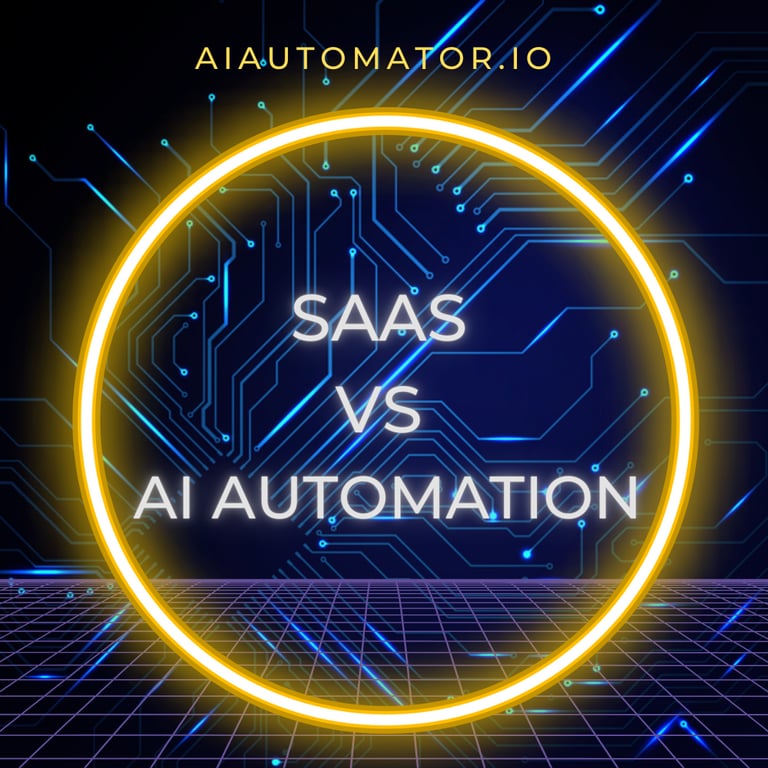SaaS vs AI Automation: A SWOT Analysis for Business Leaders
This article will compare two popular approaches: traditional Software as a Service (SaaS) solutions and AI-powered automation tools like Flowise or Make.com. We'll conduct a SWOT (Strengths, Weaknesses, Opportunities, Threats) analysis to help you make an informed decision about which path is best for your organization.
Jason Siow
8/23/20243 min read


In today's rapidly evolving business landscape, automation has become a crucial factor in maintaining competitiveness and efficiency. As a business owner or top manager, you're likely considering various options to streamline your operations. This article will compare two popular approaches: traditional Software as a Service (SaaS) solutions and AI-powered automation tools like Flowise or Make.com. We'll conduct a SWOT (Strengths, Weaknesses, Opportunities, Threats) analysis to help you make an informed decision about which path is best for your organization.
SaaS Solutions: SWOT Analysis
Strengths
Proven track record in business automation
Wide range of specialized tools for various industries
Generally user-friendly interfaces
Regular updates and improvements
Weaknesses
Limited customization options
Potential for data silos between different SaaS tools
Recurring subscription costs
Opportunities
Integration with emerging technologies
Expansion of features to cover more business processes
Improved data analytics capabilities
Threats
Increasing competition from AI-powered alternatives
Potential for obsolescence as AI technology advances
Data security concerns with cloud-based solutions
AI Automation (using Flowise or Make.com): SWOT Analysis
Strengths
Highly customizable workflows
Advanced task automation capabilities
Ability to handle complex, multi-step processes
Potential for significant cost savings in the long run
Weaknesses
Steeper learning curve compared to traditional SaaS
Requires some technical expertise to set up and maintain
May need regular fine-tuning as business needs evolve
Opportunities
Continuous improvement through machine learning
Expansion into new areas of business automation
Integration with cutting-edge AI technologies
Threats
Rapidly changing AI landscape may require frequent updates
Potential ethical concerns surrounding AI decision-making
Resistance from employees fearing job displacement
Comparing SaaS and AI Automation for Specific Tasks
Let's examine how SaaS and AI Automation solutions compare when it comes to some common business tasks:
Email Automation
SaaS: Offers template-based solutions with basic personalization
AI Automation: Provides advanced personalization and content generation based on recipient data and behavior
Report Automation
SaaS: Generates standardized reports with predefined metrics
AI Automation: Creates dynamic reports with AI-driven insights and predictive analytics
Marketing Automation
SaaS: Offers rule-based campaign management and basic segmentation
AI Automation: Enables hyper-personalized campaigns, predictive customer behavior modeling, and real-time optimization
Data Automation
SaaS: Provides structured data processing and basic analysis
AI Automation: Offers advanced data processing, including unstructured data analysis and automated pattern recognition
Customer Service Automation
SaaS: Implements basic chatbots and ticket routing systems
AI Automation: Utilizes natural language processing for advanced chatbots and intelligent ticket prioritization
Preparing Your Business for the AI Revolution
As we move towards an AI-driven future, it's crucial for businesses to prepare for this transformation. Here are some steps you can take:
Assess your current automation needs and identify areas where AI could make a significant impact.
Invest in employee training to develop AI literacy across your organization.
Start small with pilot projects to test AI automation in specific departments or processes.
Develop a data strategy to ensure you have quality data to feed your AI systems.
Stay informed about AI advancements and their potential applications in your industry.
Foster a culture of innovation and continuous learning to embrace AI-driven changes.
Conclusion: Embracing the Future of Business Automation
The comparison between SaaS and AI Automation solutions reveals that both have their strengths and weaknesses. While SaaS offers tried-and-tested solutions with user-friendly interfaces, AI Automation provides unprecedented levels of customization and efficiency.
As we progress into the AI revolution, businesses that embrace these new technologies will likely gain a significant competitive advantage. AI-powered tools like Flowise and Make.com are opening up new possibilities in task automation, data analysis, and decision-making processes.
The future of business automation is bright, with AI poised to transform industries and create new opportunities for growth and innovation. By preparing your organization now, you'll be well-positioned to leverage these advancements and thrive in the AI-driven business landscape of tomorrow.
Remember, the key to success in this new era is not just adopting technology, but also fostering a culture of continuous learning and adaptation. With the right mindset and tools, your business can harness the power of AI to achieve unprecedented levels of efficiency, productivity, and success.
Stay updated with our cutting-edge AI developments by subscribing to our newsletter.
Be the Alpha!
Copy right 2025 AI Automator.io | Futurepreneur Academy Sdn Bhd.